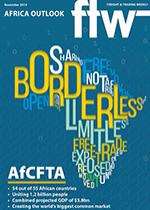Plastic bags are on their way to extinction as the national flower of a growing number of African countries. The continent is the world leader in plastic bag regulations, with around 31 bans having been passed in SubSaharan Africa in recent years. Most recently Tanzania started confiscating plastic bags brought into the country by visitors in the second phase of its anti-plastic initiative, which was introduced in 2017 to “protect the youth and environment”. Kenya has the world’s highest penalties. Manufacturers, importers, distributors and users found with plastic bags face up to $38 000 in fines or four years in prison. Rwanda is aiming to be the world’s first plastic-free country. From a logistics perspective, these developments mean that new packaging and packing methods have to be found to replace plastic bags. For an investor or someone wanting to do business in Africa, it would seem that the economies have progressed to the point where the governments have the luxury of focusing on seemingly minor issues like plastic bag pollution. Anyone who has travelled anywhere in Africa will know that it is far from true. In practically every country the population is growing much faster than the economy can create jobs. If the current rate of population growth continues, this situation will get worse. By 2100, more than half of the world’s population growth is expected to be in Africa, which will be home to 4.1 billion people by 2100, or over one third of the world’s population. By 2050 the African population could reach as much as 2.4 billion. But that same traveller will see signs of hope. According to the 2019 Doing Business report of the World Bank, it is becoming easier to do business in many Sub-Saharan countries. The region’s largest economy, Nigeria, has earned a place among the year’s top global improvers alongside Togo, which is on the list of top improvers for the second year in a row. Nigeria conducted reforms impacting six indicators, which placed the 200-million-person economy among the world’s top improvers. Kenya also carried out six reforms, putting it third highest in the regional rankings, behind Mauritius and Rwanda. With four reforms implemented this year, Mauritius remains the easiest place to do business in the region, ranking 13th globally. Countries across the continent are also investing heavily in physical logistics infrastructure, including ports, rail and road links. Challenges remain, however. When it comes to trading across borders, importers spend about 96 hours on documentary compliance, versus 3.4 hours in OECD highincome economies. The continent bans plastic bags with the stroke of a bureaucratic pen, but cannot create jobs or curb runaway population growth, and remains a risky place in which to do business. But, for companies involved in any of the links in the logistics chains serving the continent, the bigger risk would be to underestimate the potential. In the worst-case scenario, there will be millions of mouths that will need to be fed with the assistance of aid. At best, the much-touted “youth bulge” will ignite a boom in the manufacturing sector, which will translate into jobs and demand for consumer goods. Given the size and complexity of the continent, it is likely that both scenarios will play out in different countries – and even different regions within the same country. Logistics companies will need local knowledge, contacts and flexibility in order to keep freight moving.

